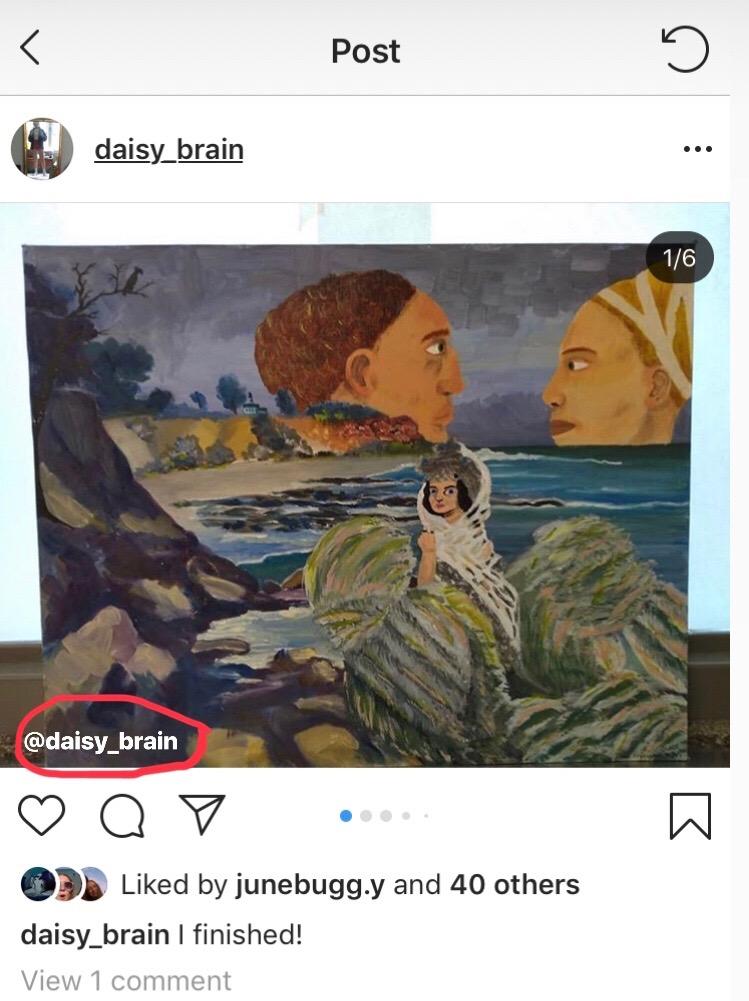
If you’re like most people you spend a good chunk of your day scrolling through Instagram, liking photos, and getting lost on the “explore” page. With seemingly endless access to beautiful images and stunning works of art, it can be tempting to take a screenshot and post an image on your page. However, many don’t realize how damaging reposting can be when proper credit is not given to creators.
To avoid damaging an artist’s career or getting into legal trouble, here’s a list of things to keep in mind if you want to repost a photo.
- Know Instagram’s Rules: According to Instagram’s Terms of Service (TOS), every individual is responsible for any content they share on the platform. Therefore, when you share content you didn’t create it is then your responsibility to make sure you have permission to use that content and post it on your profile. In short, as long as you have obtained permission to use and repost and image, you are not at risk of violating Instagram’s TOS.
- Understand Copyright Law: When someone creates an image, video, clip, or any kind of content, they own the copyright to it and therefore all of the revenue generated from it. According to the Visual Artists Rights Act (VARA), artists reserve the right to prevent the use of their name on a work they did not create and prevent others from changing or reworking their in a prejudicial way. “Reposting an artist’s work can be detrimental to their integrity,” says artist Sage Freewynn (11). “Even if you rework an image, it doesn’t make reposting okay.” Many get into sticky situations with copyright law when they don’t follow the rules Freewynn describes. For example, if a company reposts an image of their product taken by a consumer and uses that image to make sales, then legally any revenue the company gained from that post belongs to the person who created the original image and they could, theoretically, sue for the profits generated from it.
While this is certainly a worst-case scenario, it’s still something to think about each time you’re considering reposting content. In most cases, when you wrongfully repost someone else’s work, you will receive a request to remove the content or a cease and desist order (request from an individual or entity to stop doing a certain activity or risk facing persecution). Either way, this is not a situation anyone wants to deal with and can be easily avoided by obtaining proper permission before reposting anything online.
- See Things from a Creator’s Point of View: Perhaps the most important thing to do when considering reposting art is to consider the act from the point of view of the content’s creator. “Artists put hours of work into their art and make the difficult decision to put it into the world and face criticism,” says Freewynn. “Lots of artists struggle to make a sustainable income off commissions, so getting their art out is really important publicity.”
According to a 2015 survey conducted by Artsy.net, a leader in the online art world and extensive online art database, 85 percent of surveyed art collectors reportedly browsed Instagram more than twice a day and 51 percent of respondents said that they had purchased art by artists they had discovered on Instagram. “Instagram is especially important for emerging artists and photographers,” says Freewynn. “It is one of the best ways for them to gain exposure. Using their art without permission or credit robs them of the exposure needed to accelerate their careers.” An artist puts their heart and soul into their work, and that kind of passion deserves to be respected regardless of what any law says.
- Find Ways to Obtain Permission: The bottom line is that if you’re thinking about reposting anything on Instagram, you need to get consent from the creator. There are essentially two types of consent: implied consent and explicit consent. Implied consent mainly occurs when a creator posts an image under the expectation that it will later be reposted by someone else. However, this kind of consent can be a gray area because it is not a formal release of copyright or permission to use the content. While implied consent is not likely to get you into legal trouble, it is best to rely mainly on explicit consent.
Luckily, there are many ways to gain explicit consent from a creator. The fastest and easiest way is to ask for permission, in the comment section of their post. Once the creator has given you permission you are free to repost the image on your account so long as you still credit the original creator. If you want to keep the request private, you can ask for permission over Direct Message and repost the image once you’ve obtained permission.
Obtaining proper permission from an artist may seem like a bit of a chore at first, but in the end, you are ensuring the protection of both yourself and the creator by simply asking permission to repost. “Reposting can be a great thing,” says Freewynn. “As long as you have explicit permission to do so.” So next time you see a cool image pop up on your Instagram feed, take a minute to think before reposting. I promise you’ll be a lot happier in the long run.

































